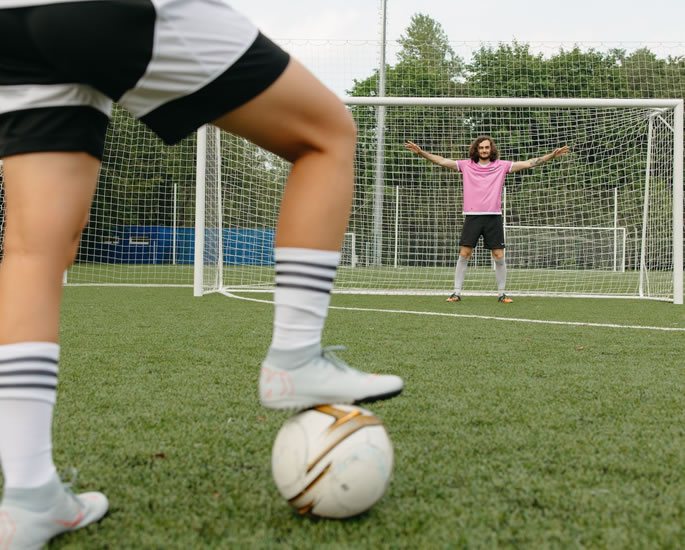Running also provides an opportunity for solitude
In today’s fast-paced and demanding world, the importance of mental well-being cannot be overstated.
Engaging in regular physical activity has long been recognised as a powerful tool for improving both physical and mental health.
Sports, in particular, offer a unique avenue to enhance mental well-being by combining physical exertion with the psychological benefits of competition, teamwork and personal growth.
Sports have long been associated with mental well-being. Playing sport releases endorphins and other neurotransmitters.
These chemicals contribute to improved mood, stress reduction and overall mental wellness.
We look at some of the sports that are most effective in helping with mental well-being and the ways that they do this.
Running

Running is a high-intensity aerobic exercise that engages multiple muscle groups and requires a significant amount of energy.
It can burn a large number of calories in a relatively short amount of time. The exact number of calories burned depends on factors such as body weight, speed, distance and terrain.
Running elevates your heart rate and increases your metabolic rate during and after the activity.
This means that your body continues to burn calories at a higher rate even after you finish running, thanks to the “afterburn effect” or excess post-exercise oxygen consumption (EPOC).
Running is also very accessible as it requires minimal equipment. Whether you prefer running outdoors or using a treadmill, it offers convenience and flexibility in terms of time and location.
Through various mechanisms, running promotes mental well-being.
It can help reduce stress, improve mood and alleviate symptoms of anxiety and depression.
Running also provides an opportunity for solitude, self-reflection, and mental clarity.
Swimming

Swimming is also known for its calming and meditative qualities.
The rhythmic movements, focus on breathing, and the weightlessness of being in the water can help reduce stress, promote relaxation and improve mood.
Swimming can be a therapeutic and refreshing activity for the mind.
Engaging in swimming releases endorphins, often referred to as “feel-good” hormones, which can improve mood and promote a sense of well-being.
The combination of physical exertion, breathing control, and the release of endorphins can have a positive impact on mental health, helping to reduce symptoms of depression and anxiety.
It requires concentration and focus on technique, breathing and body movements.
This focus on the present moment can lead to a state of mindfulness, where the swimmer is fully immersed in the sensations and rhythm of swimming.
Practising mindfulness during swimming can help reduce racing thoughts, improve mental clarity, and enhance overall focus and attention.
Swimming has been known to improve sleep quality as it helps tire the body and provides a mental respite, promoting a night of deeper and more restful sleep.
Tennis

Tennis requires constant mental focus and concentration. Players must anticipate and react quickly to the ball, strategise their shots, and make split-second decisions.
This level of mental engagement can help improve concentration skills, enhance cognitive function, and foster mental sharpness.
Tennis is a strategic sport that involves analysing opponents’ weaknesses, adapting to changing game situations and finding effective strategies to win points.
Engaging in tennis can improve problem-solving skills, as players learn to assess situations, think critically, and make strategic decisions under pressure.
It also provides opportunities for personal achievement and skill development.
Improving technique, winning matches, and reaching personal goals can boost self-confidence and self-esteem.
Overcoming challenges and seeing progress in tennis can enhance belief in one’s abilities and contribute to a positive self-image.
Golf

Golf contributes to mental well-being in a number of ways.
It is often played in serene outdoor settings, providing a peaceful and calming environment.
Spending time in nature and engaging in physical activity can help reduce stress levels and promote relaxation.
The combination of fresh air, green surroundings, and the rhythmic movements involved in playing golf can have a soothing effect on the mind.
The sport requires a high level of concentration and focus on each shot. The strategic nature of the game, combined with the need for precise technique, encourages players to be fully present in the moment.
This focus on the present moment can foster mindfulness, helping to alleviate worries about the past or future and promote a sense of mental clarity.
Golf is a sport that requires patience and resilience. It involves overcoming challenges, adapting to different course conditions, and accepting that not every shot will be perfect.
Learning to stay focused, maintain composure, and bounce back from setbacks can cultivate mental resilience and improve coping skills, both on and off the golf course.
Football

Playing football can provide an outlet for releasing tension.
The physical activity involved in playing football stimulates the release of endorphins, which are natural mood boosters that help reduce stress and promote relaxation.
The focus required during gameplay can also help distract from everyday worries and pressures.
The physical exertion and cardiovascular exercise associated with playing football also increase the production of neurotransmitters like serotonin and dopamine, which are known to improve mood and enhance feelings of happiness and well-being.
Football is a team sport that emphasises cooperation, communication and teamwork.
Playing football provides opportunities for social interaction and building relationships with teammates.
The sense of camaraderie and shared goals can foster a sense of belonging and social support, which contribute to improved mental well-being.
It can also boost confidence. As players develop their skills, contribute to the team, and achieve personal and team goals, they gain a sense of accomplishment and belief in their abilities.
This increased self-esteem can positively impact overall mental well-being and self-image.
Basketball

Basketball is another sport that can help improve mental well-being.
It is a team sport that has a focus on cooperation and communication.
It provides opportunities for social interaction and building relationships with teammates.
Regular participation in basketball contributes to overall physical fitness, which is closely linked to mental well-being.
The physical activity and cardiovascular exercise associated with basketball release endorphins, reduce the risk of chronic health conditions and improve overall energy levels, all of which positively impact mental health.
Basketball also provides opportunities to practice emotional regulation skills. The competitive nature of the sport can evoke a range of emotions, including excitement, frustration and disappointment.
Players learn to manage and control their emotions, stay focused under pressure, and recover from setbacks.
Developing emotional resilience through basketball can be valuable for managing emotions in other aspects of life.
Martial Arts

There may be different forms of martial arts but all of them place a strong emphasis on self-discipline and self-control.
Practitioners learn to adhere to strict training routines, follow instructions from instructors, and develop a disciplined approach to their practice.
This discipline can extend beyond martial arts training and positively impact other areas of life, such as work, education and personal relationships.
It requires a high level of focus and concentration. Techniques, forms, and sparring drills demand mental presence and attention to detail.
By training their minds to remain focused during practice, martial artists develop enhanced concentration skills that can be applied to other areas of life.
Martial arts training often involves facing and overcoming physical and mental challenges.
Practitioners learn to push through adversity, persist in the face of difficulties and embrace a growth mindset. This process of developing mental resilience can help individuals better cope with challenges and setbacks in other areas of life.
Many martial arts incorporate elements of mindfulness and meditation.
Techniques such as breathing exercises, forms (katas), and meditation practices are commonly integrated into training sessions.
These practices promote mindfulness, mental clarity and self-awareness, which contribute to overall mental well-being.
There is a diverse range of sports available and their potential benefits for mental well-being.
It reinforces the notion that finding the right sport or activity that aligns with one’s interests and preferences is crucial for maximising the positive impact on mental health.
Incorporating sport into one’s lifestyle enhances physical and mental well-being as well as overall quality of life.






























































